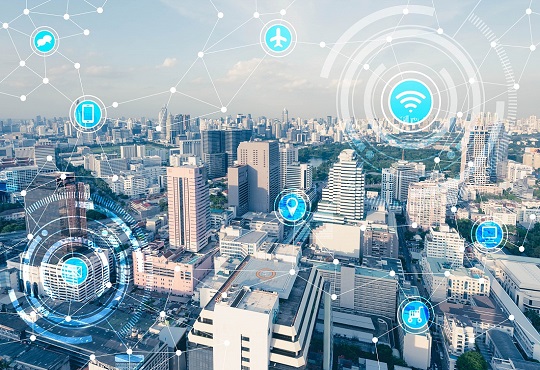Role of Artificial Intelligence in Smart Cities
Vishal Pratap Singh | Monday, 03 January 2022, 02:12 IST

From smartphones to smart cities, the world is getting smarter at a very fast pace. Increasingly, cities are setting their sights on how they can use technology to streamline and automate all the processes that come from urbanization. As per the report submitted by International Data Corporation, the spending on smart cities is likely to reach more than $130 billion by 2022. It will make the life in urban areas and cities more comfortable with advanced infrastructural facilities and society management system. AI in smart cities is aiming to achieve sustainable growth by making the cities equipped with advanced features to live, walk, shop and enjoy a safe and more convenient life in such environments.
Governments at every level, as well as public and private organisations, are facilitating technological implementation and digital transformation. Private and public partnerships have become a major mechanism by which cities can adopt technology that makes them smarter. “The best course of action is to embrace Artificial Intelligence that blends knowledge based reasoning with advanced digitalisation techniques”, says Navin Nageli, CEO, Navjoy Inc. It helps the stakeholders to distinguish unanticipated scenarios and make tough choices.
Provides an Advanced Surveillance System
Artificial Intelligence enabled cameras and sensors can keep an eye on the surroundings to enhance security level in the city’s neighbourhoods. These cameras can recognize the people, their faces and can track any unusual activity done by them in restricted areas. Experts have developed high resolution AI security camera system which can track the movement of all registered vehicles and can monitor crowd density and cleanliness of public spaces round the clock. Police can predict category and intensity of crimes by monitoring all such activities in a particular area with the help of historical data available from different departments of the city.
Helps in Traffic Management
In most of the big cities, there is a huge movement of commercial vehicles used by the people to move from one place to another as well as to transport goods. So, Artificial Intelligence can be used for parking and traffic management of such vehicles. Using the road surface sensors or CCTV cameras incorporated into parking spots allows cities to create real time parking and traffic maps, helping drivers to save enormous time by avoiding long queues to find an empty spot for parking or to move smoothly in traffic.
The traffic sensor systems supported by Artificial Intelligence can make use of cameras to collect real time data of vehicles on road and send it to a control centre. Control centre collates the data fed from other points and adjusts the signal timings to ensure smooth flow of vehicles. Smart transportation also includes public sector and due to Artificial Intelligence, there are lots of opportunities of improvement for public transit. Now, even the cab services like Uber are also using AI to give a better riding experience to its customers.
Face Detection Technology
Artificial Intelligence in face detection technology is capable of detecting the different people from their faces disclosing their personal identities. Industry professionals suggests to use AI in security cameras or drones so that it can recognize the human faces and match them with the database to trace their identity and authenticate the person entering in the city, housing society and any other restricted area.
The technique which is used to train the Artificial Intelligence based model in face detection system is known as Landmarking Annotation. This high level face detection technology is necessary to make the surroundings more safe and private which ultimately makes the cities smart.
Better Disposal Facilities
Usually, it is seen that people living in cities produce huge amount of waste due to which the urban waste management is considered as a challenge for municipal corporations. In fact, in the recent times, it is found that the right way of managing the generated garbage and keeping environment clean and hygienic in the society is a challenge which is faced by most of the countries globally. Artificial Intelligence enabled cameras can detect trash thrown on the street and recognize the types of garbage for categorization.
Also, installing Artificial Intelligence enabled sensors on dust bins can make waste collection more efficient. The responsible authorities can receive notifications when the bins are about to be filled and ensure reducing of operational costs by eliminating unnecessary pickups, providing dynamic collection routes and schedules for optimization of efficient waste management.
The Future of AI in Smart Cities
Artificial Intelligence is invaluable when it comes to its role in this transformational stage facing the utilities sector. To develop the Artificial Intelligence enabled systems for the development of smart cities, companies working on AI technology will need huge amount of training data for smart cities. This data will help to train the models like drones, AI enabled security camera and face recognition system to work with accuracy and provide the correct information making the smart cities really smart for sustainable growth.



.jpg)
